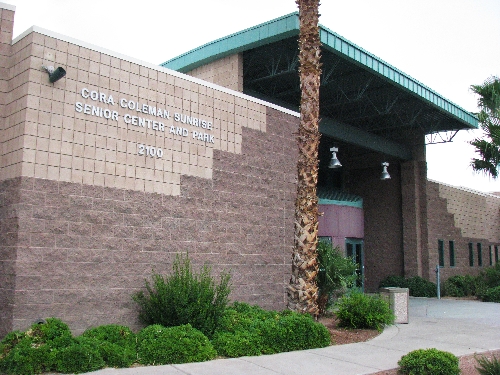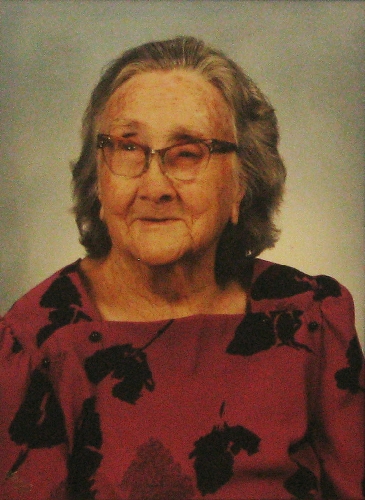Cora Coleman Senior Center namesake lauded for representing best of ‘heartland values’
Many government buildings are named for politicians, businessmen or military figures. The Cora Coleman Senior Center at 2100 Bonnie Lane is named for a mom.
"I'm sure the whole thing would have embarrassed her," said Coleman's daughter, former Clark County Commissioner Mary Kincaid-Chauncey. "She wasn't one for the limelight. I think she'd be pleased, but she'd always blush when people would compliment her."
In an Oct. 17, 2001, View story about the dedication of the center, former Sen. Richard Bryan, a friend of the family, said even though the center could have been named for someone of prominence and distinction, it is appropriate to name it for "Mary's mother -- just an ordinary soul" who represented the best heartland values that make America great.
"I was privileged to know her. And I know she would have objected to this honor. She wouldn't have wanted anything this ostentatious named after her," Bryan said.
Kincaid-Chauncey's political career was punctuated with a two-year stint in federal prison for charges related to Operation G-Sting, an FBI probe into bribes and unreported campaign contributions, but prior to that she served for 15 years on the North Las Vegas City Council and eight years as Clark County Commissioner.
The senior center was named for Coleman in 2001, and the facility was later expanded to include a seniors pool.
"All the commissioners get to name something in their district," Kincaid-Chauncey said. "Most of them actually name things after themselves, but I really didn't think I've done anything that warrants naming something after me. I thought my mother really deserved having something named after her."
Kincaid-Chauncey's mother was born in 1894 in Walla Walla, Wash. Her family moved to Indiana soon after, and she earned teaching credentials at Indiana State Normal School. She had 14 children with her husband, Fay, but four died before age 2. Of the surviving 10, two were girls who had married and moved out of the house by the time Kincaid-Chauncey was born to a house with seven brothers living at home.
Five of those brothers served during World War II, the other two during the Korean War. One of the brothers died during the latter conflict, and Coleman became an active member of the Gold Star Mothers, an organization for women who have lost a child in military service. The group provides support to fellow members and does volunteer work.
"Back in those days, they used to read the lists of the missing in action and killed in action on the radio," Kincaid-Chauncey said. "My mother used to listen to those lists for hours. I remember her crying on the couch with my father when she heard my brother's name.'
During WWII, Fay Coleman worked for the Department of Defense. That job went away when the war did, and he found himself a man in his late 50s competing for jobs with young veterans. The family lost its house and sold all its furniture and took only what it could fit in or on its car. One year, Kincaid-Chauncey attended 11 different schools.
"He was a finish carpenter, and we drove from town to town looking for work," Kincaid-Chauncey said. "He'd get a job working on someone's cabinets or doing work he got through the union for a few weeks, and then we'd move on to the next town."
The family lived out of its car for the most part, sleeping outdoors when the weather was warm and cooking over a fire. Fay Coleman would play the guitar to entertain the family.
"I guess you could say we were homeless before anybody really knew what that was," Kincaid-Chauncey said. "My parents never thought of it that way, because wherever they were, that was their home."
Despite the difficulties, Kincaid-Chauncey said she never remembers her mother complaining or cursing. Even the word "darn" was forbidden, because Cora Coleman felt that if you were saying that word, you were thinking a worse one.
"We arrived in Snyder, Texas, on Christmas Eve, I think it was 1948," Kincaid-Chauncey said. "My dad parked in front of a house with Christmas decorations, and we sang Christmas carols. My mother gave me a shoebox that had my present, a rubber doll with clothes she'd sewn and crocheted. It was such a wonderful Christmas. It was the one Christmas I really remember."
The Colemans first came to the Las Vegas Valley in 1946, although they continued to roam for jobs for a few years. Eventually they lived in what Kincaid-Chauncey described as a shack in the Whitney area before finally settling in North Las Vegas.
Cora Coleman made all of the family's clothes, crafting patterns out of newspaper after looking at a picture of a finished outfit in a catalog. Her skills were so good that Kincaid-Chauncey's schoolmates begged her to get her mother to make clothes for them, too.
"I didn't realize how poor we were until I was grown," Kincaid-Chauncey said. "Because they were such good, fun-loving people, they just made life interesting and I never realized I was missing anything."
When the family finally settled down in the valley, Cora Coleman quietly became an asset to the community.
"If a neighbor or anyone needed help, she was right there," Kincaid-Chauncey said. "She would give her last dollar or the shirt off her back. She was that kind of person."
Cora Coleman died three weeks short of her 100th birthday and was active until she was 98.
"We'd take her to the senior centers, and she'd play games and was very involved with her friends," Kincaid-Chauncey said. "She felt people needed to stay active no matter how old they got. She said, 'You're only as old as you feel, and if you sit around, you get bored and you feel older,' and that's why naming the senior center for her made so much sense."
Clark Commissioner Tom Collins, who followed Kincaid-Chauncey as District B Commissioner, admits that the naming process is a little looser here than it is in some parts of the country.
"I guess Mary Kincaid-Chauncey really loved her mother," Collins said. "She wasn't the sort of public figure that things usually get named for."
Kincaid-Chauncey admits that naming something for a person like her mother is unusual, but she feels it was also highly appropriate.
"She was one of the great unsung heroes of the century, and there were a lot of those," Kincaid-Chauncey said. "The people who raised their families went through hardships and did what they had to do. People who didn't always have much but made it through with a cheerful attitude. I think there were a lot of people like that in this community, and I wish that I could name something after every one of them."
Contact Sunrise and Whitney View reporter F. Andrew Taylor at ataylor@viewnews.com or 380-4532.
Naming Las Vegas
The history behind the naming of various streets, parks, schools, public facilities and other landmarks in the Las Vegas Valley will continue to be explored in a series of feature stories appearing in View editions published on the first Tuesday of every month.
If you're curious about how or why something got its name, post a comment on our Facebook page, www.facebook.com/viewnewspapers, or email sblust@viewnews.com.
Thanks for reading View. Learn more about names
Local street name guru and frequent "Pawn Stars" expert Mark Hall-Patton plans to speak from
11:15 a.m. to 12:15 p.m. Wednesday at the Cora Coleman Senior Center, 2100 Bonnie Lane, 455-7617. For more information, visit clarkcountynv.gov.















